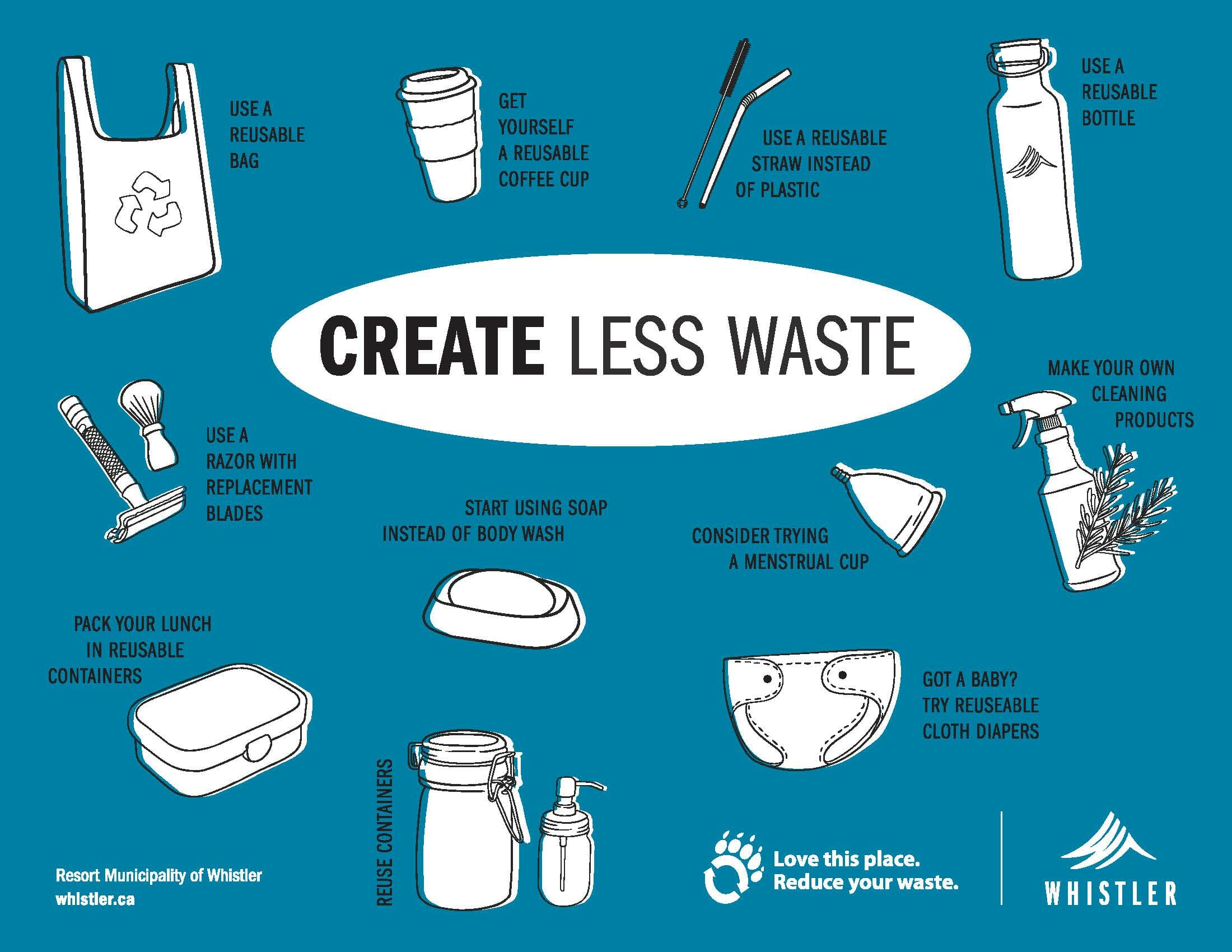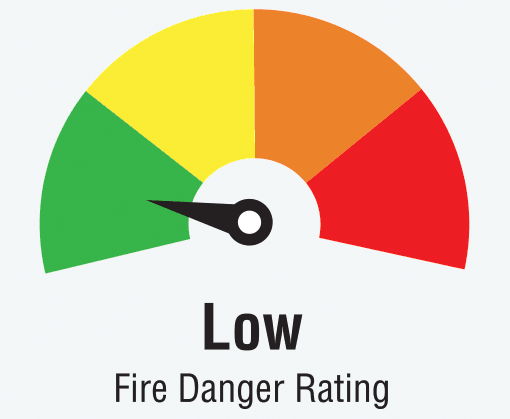
Reducing waste is about making less of it. Not just recycling more.
Less garbage allows residents and businesses to use smaller bins and requires less frequent collection. This reduces costs, reduces trucks on the road and reduces the amount of waste in our landfills. It allows more time, money and resources to be spent on things other than garbage.
It’s not about perfection. It’s about a conversation and a journey that we hope you’ll consider.
The first step is reduce and reuse
- Repairing before replacing. Whether it is sports equipment or a home appliance, there are very often solutions for something broken. Before tossing a jacket that is missing a zipper, have a look to see if there are services (or a talented neighbour) nearby. It’s better for the planet and your wallet.
- Buying used before buying new. We are lucky in Whistler to have many options that support the recycling of quality used materials. If you haven’t found a gem at one of the Whistler Community Services Society local stores, you aren’t shopping there often enough. Learn more about The Re-Build It Centre and The Re-Use It Centre.
- Borrow before buying new. Check out the Whistler Public Library or The Re-Build It Centre tool library to borrow board games, bike tools, books and more!
The second step is recycle and compost
Here are items regularly found in the garbage that don’t need to be there. If you are looking to make a difference, start with these.
About a third of an average household’s garbage is food. Food scraps rotting in the landfill, without access to oxygen, generate methane. Methane is a greenhouse gas 20 times more potent than carbon dioxide.
A lot of resources also go into growing food, including water, fertilizers, transportation, storage, packaging, energy to cook and clean, and more. All this is lost when food is thrown away.
What you can do:
- Reduce the amount of food you throw away. Use Love Food Hate Waste to plan meals and use the food in your fridge efficiently.
- Compost any leftover food waste or unavoidable food waste such as egg shells and bones. Composting these materials instead of putting them in the garbage decreased landfill waste and instead creates a useful soil amendment that can be used to grow more nutrient rich food.
About 185,000 tonnes, or 13 per cent, of waste in the landfill is paper. This includes newspapers, flattened cardboard boxes and paper towels.
What you can do:
- Find alternatives to disposable paper products. For example, use cloths more in the kitchen instead of relying on paper towels.
- Put tissue paper bags, pizza boxes and bakery sheets in the compost.
- Keep unwanted paper out of your house.
- Contact Canada Post to halt the delivery of ad mail.
- All office and home printers should be set to print double-sided.
About 13 per cent of the average household’s garbage is plastic. Plastic does not go away, ever. At best it breaks down into tiny fragments. Plastics are also manufactured using fossil fuels, like petroleum or natural gas
A lot of the plastic found in garbage is recyclable. Recycling plastic allows some of the energy that went into manufacturing it to be reclaimed.
When plastic bags blow away from a recycling bin, they often make their way to waterways and eventually to the ocean where they interfere with wildlife.
Learn about what plastics we can recycle in Whistler through Recycle BC.
What you can do:
Avoid single-use, disposable products.
- Take your own grocery bags including cloth produce bags. If you rely on plastic bags, reuse them over and over.
- Refill a reusable bottle with tap water instead of buying single-use plastic bottles.
- Say no thanks to straws.
- Pack lunch in reusable containers to avoid plastic sandwich baggies and plastic film.
- Give experiences rather than material items
- Buy bulk products and avoid processed goods
- Most food packaging such as granola bar wrappers, bread and produce bags and rice packaging can be recycled at the Nesters or Function Junction waste depots. Set up an easy collection place in your kitchen, and commit to using it.
- Choose to purchase items made out of recycled material, and support recycling industries. Toys are a great example.
Yard waste continues to turn up in the landfill, and represents over seven per cent of household garbage per year.
What you can do:
- Collect yard waste in a bin separate from other garbage. Bring it to the yard waste bin at the Function Junction depot from April to November daily from 7 a.m. to 7 p.m.
- Contact the FireSmart Community Chipper to remove natural wood debris from residential and strata properties.
- Drop off your Christmas trees at the Nesters and Function depots during the three-week period after Christmas.
Although e-waste is only two per cent of the total waste in the landfill, it represents about 22,000 tonnes per year. Valuable and scarce metals like copper can be harvested from e-waste, instead of mining new sources. Plastics can be recycled. Display units are often disposed, but other parts such as audio components can be reused.
The electronics industry is becoming more responsive to the waste associated with making, shipping, distributing, packaging and disposing of e-waste. Ask questions when you purchase new equipment.
What you can do:
- Collect your e-waste such as batteries, wires and broken electronics and bring them to the Regional Recycling Centre.
- Bring unwanted electronics in good, working condition to the Re-Use it Centre.
When asked, most of us don’t think we have hazardous waste at home, but we do. Electronics, household cleaners, fluorescent light bulbs, paint, cleaning solutions and other things we use every day contain toxic chemicals and heavy metals.
What you can do:
- Never flush hazardous liquids down the drain or sewer. They will end up in our rivers and oceans. Paint, oil and unmarked solvents all need to be safely disposed.
- Keep chemicals off your family and out of your home. Choose natural-based cleansers.
- Household hazardous wastes such as consumer paint, fuel and pesticides can be delivered to GFL headquarters in Squamish or Regional Recycling Centre in Whistler.
Holiday waste
Learn how to reduce, reuse and recycle your holiday waste with these tips.

